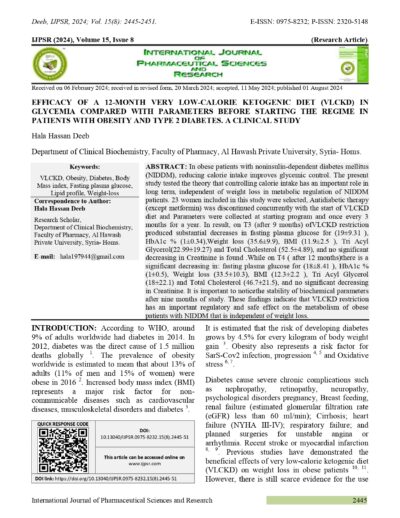



Authors :
Prof. Hala Hassan Deeb
Research Scholar:
Department of Clinical Biochemistry, Faculty of Pharmacy, Al Hawash Private University, Syria- Homs.
ABSTRACT :
In obese patients with noninsulin-dependent diabetes mellitus (NIDDM), reducing calorie intake improves glycemic control. The present study tested the theory that controlling calorie intake has an important role in long term, independent of weight loss in metabolic regulation of NIDDM patients. 23 women included in this study were selected, Antidiabetic therapy (except metformin) was discontinued concurrently with the start of VLCKD diet and Parameters were collected at starting program and once every 3 months for a year. In result, on T3 (after 9 months) ofVLCKD restriction produced substantial decreases in fasting plasma glucose for (19±9.31 ), HbA1c % (1±0.34),Weight loss (35.6±9.9), BMI (11.9±2.5 ), Tri Acyl Glycerol(22.99±19.27) and Total Cholesterol (52.5±4.89), and no significant decreasing in Creatinine is found .While on T4 ( after 12 months)there is a significant decreasing in: fasting plasma glucose for (18±8.41 ), HbA1c % (1±0.5), Weight loss (33.5±10.3), BMI (12.3±2.2 ), Tri Acyl Glycerol (18±22.1) and Total Cholesterol (46.7±21.5), and no significant decreasing in Creatinine. It is important to noticethe stability of biochemical parameters after nine months of study. These findings indicate that VLCKD restriction has an important regulatory and safe effect on the metabolism of obese patients with NIDDM that is independent of weight loss.
Keywords :
VLCKD, Obesity, Diabetes, Body Mass index, Fasting plasma glucose, Lipid profile, Weight-loss.